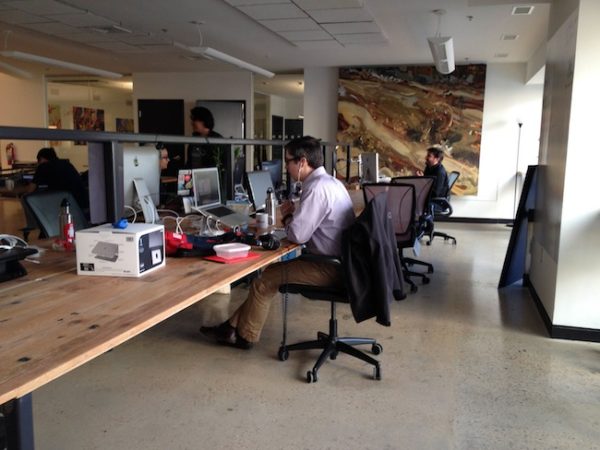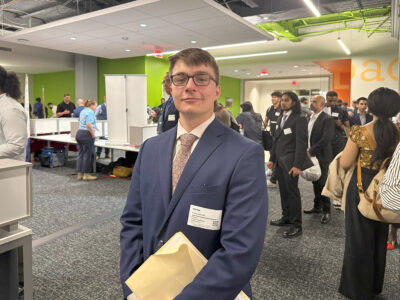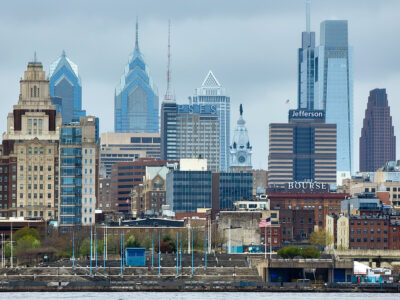Coworking space CityCoHo opened its doors in the midst of last winter’s polar vortex.
It was the worst possible time to launch, said Drew Foulkes, who runs the Center City-based sustainability-focused space. No one wanted to venture outdoors.
In the first few months of 2014, CityCoHo didn’t see the momentum they’d hoped for and “kind of freaked out,” said cofounder Max Zahniser. But come spring, membership began to grow.
Today, the two-floor, 13,000-square-foot space on the ground floor of 2401 Walnut Street is just under half-filled and management has broken even, Zahniser said. 2401 Walnut Street developer Chuck Block funded the development of the coworking space. The space has also hosted numerous events, like the Code for Philly civic hacking meetup, the Philadelphia WordPress Meetup and this fall’s Product Hunt meetup.

(Photo by Juliana Reyes)
Members include:
- Anchor tenant Delaware Valley Green Building Council (which has its own private office that was built specifically for them)
- A local office of New York City-based recycling rewards company RecycleBank
- Consumer engagement startup SocialLadder
- The Philly arm of dev firm thoughtbot (which just moved out of the area’s open space and into a private office)
- Curalate, the growing visual analytics startup with offices in the same building, has a handful of memberships so its staffers can use the space at will. They call it “Curalate South.”
The whole second floor — about 6,000 square feet — is still unused, though CityCoHo is in talks with a environmental advocacy organization that wants to relocate to the space, Zahniser said.

CityCoHo’s second floor is still vacant. (Photo by Juliana Reyes)
Though, like other spaces in the city, Zahniser and Foulkes stress wanting to “grow smart” and not just fill the space, here are some other changes CoHo is going to make to grow the business:
- More private offices, less open space. “It’s what the market seems to be asking for,” Zahniser said. This echoes what Benjamin’s Desk cofounder Mike Maher told us: “You can rent offices all day.” The trick, he said, is to find a balance of open space and private offices, so you don’t kill the collaborative feel.
- Possibly lowering prices. “The coworking community has dropped its prices as a whole,” Zahniser said. Right now, CoHo charges $350-$500 for unlimited access. (For comparison purposes, Benjamin’s Desk charges $399 for those types of members.)
- Proactively seeking out customers. When the space got its start, CoHo did this and it now plans to ramp up these efforts again. This is a key way to make sure CoHo “grows smart” rather than just taking whoever shows up. Still, they wouldn’t turn anyone away. “We would only turn away Skeletor or Saddam Hussein,” Zahniser said.

Where CityCoHo holds events. (Photo by Juliana Reyes)
On the topic of finding sustainability-focused members, Zahniser and Foulkes said it’s less about finding companies that are working on environmental issues (though that is important) and more about accepting members who are compatible with CityCoHo’s mission. Members that care that CoHo composts or that the space uses tables made of reclaimed barn wood.
“We don’t ask for obedience, we ask for alignment,” Foulkes said.
They also have plans to expand further: with a media lab in a new University City high rise and a coworking space in Mt. Airy. While the media lab is in development now, the Mt. Airy space is still in the exploration phase, Foulkes said.

Inside the Delaware Valley Green Building Council’s office. (Photo by Juliana Reyes)
With news — and rumors — of several out-of-town coworking spaces opening up shop in Philadelphia, is CityCoHo worried about business?
Not exactly.
“We’re more likely to siphon members out of them than vice versa because of the way we’re building this community,” Zahniser said.
The buzz of those new spaces might bring people “out of the woodwork” that a more grassroots space could not, but once they get a feel for coworking, they’ll turn to more community-based spaces, Zahniser predicts.

(Photo by Juliana Reyes)

(Photo by Juliana Reyes)
Before you go...
Please consider supporting Technical.ly to keep our independent journalism strong. Unlike most business-focused media outlets, we don’t have a paywall. Instead, we count on your personal and organizational support.
3 ways to support our work:- Contribute to the Journalism Fund. Charitable giving ensures our information remains free and accessible for residents to discover workforce programs and entrepreneurship pathways. This includes philanthropic grants and individual tax-deductible donations from readers like you.
- Use our Preferred Partners. Our directory of vetted providers offers high-quality recommendations for services our readers need, and each referral supports our journalism.
- Use our services. If you need entrepreneurs and tech leaders to buy your services, are seeking technologists to hire or want more professionals to know about your ecosystem, Technical.ly has the biggest and most engaged audience in the mid-Atlantic. We help companies tell their stories and answer big questions to meet and serve our community.
Join our growing Slack community
Join 5,000 tech professionals and entrepreneurs in our community Slack today!






